|
|
|
Sort Order |
|
|
|
Items / Page
|
|
|
|
|
|
|
| Srl | Item |
| 1 |
ID:
132343
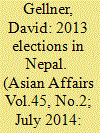

|
|
|
|
|
| Publication |
2014.
|
| Summary/Abstract |
In spite of all the difficulties, the November 2013 elections in Nepal passed off for the most part peacefully and with fewer irregularities than ever before in Nepal. The electoral system was the same as the system used in 2008, with a combination of First Past the Post and Proportional Representation. The results were a defeat for the Maoists, who went from being the biggest single party to the third biggest party. The victors were the two older established parties, the Nepali Congress and the Unified Marxist-Leninists, who seem to have benefitted from the voters dissatisfaction with the Maoists' showing in government. The second big losers in the election were the parties who favoured an ethnic-based solution to Nepal's problems, though the relationship between the Madheshis and the centre remains an unsolved problem.
|
|
|
|
|
|
|
|
|
|
|
|
|
|
|
|
| 2 |
ID:
129894
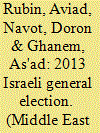

|
|
|
|
|
| Publication |
2014.
|
| Summary/Abstract |
Despite resulting in a different party configuration, the results of the 2013 Israeli general election support a similar agenda to the one set by the previous government. A year following its establishment, all indicators suggest that the current government continues to deepen neoliberal policies. Nevertheless, this election reflects two important trends: first, an ever growing discontent in Israeli public that probably would not find a solution during the tenure of the incoming government; second, lack of interest in the Israeli-Palestinian conflict that might generate negative long-term consequences.
|
|
|
|
|
|
|
|
|
|
|
|
|
|
|
|
| 3 |
ID:
130198
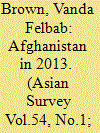

|
|
|
|
|
| Publication |
2014.
|
| Summary/Abstract |
Uncertainties about the 2014 security, political, and economic transitions pervaded Afghanistan in 2013. The failure in 2013 to sign a U.S.-Afghan security agreement permitting the presence of U.S. troops after 2014 deepens those anxieties. As ISAF forces continued to withdraw from Afghanistan, Afghan security forces now have primary responsibility for Afghanistan's security but still face critical challenges and an undefeated Taliban. Peace negotiations have been stalled. Politics were dominated by the upcoming 2014 presidential election that can renew the legitimacy of the existing political system or throw the country into turmoil.
|
|
|
|
|
|
|
|
|
|
|
|
|
|
|
|
| 4 |
ID:
133602
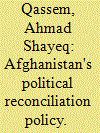

|
|
|
|
|
| Publication |
2014.
|
| Summary/Abstract |
The Afghan government's peace and reconciliation overtures to the militants, initially at the unofficial level but later sanctioned officially, have formed a key theme of state security policy from the early days of the post-Taliban administration in Afghanistan. Yet far from producing peace and stability, they seem to have played into the hands of the violent groups intent on overthrowing the country's internationally supported and legitimate political system in the past decade. There is no doubt about the importance of national reconciliation as a wider process of overcoming the legacy of beleaguered social relationships and forging a common vision for the future among all Afghans, but the nature of the government's reconciliation policy, which borders on appeasement of the militants, seems so far to have created more vulnerabilities than strengths in the face of increasingly emboldened anti-state violent groups.
|
|
|
|
|
|
|
|
|
|
|
|
|
|
|
|
| 5 |
ID:
118782
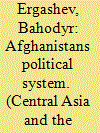

|
|
|
| 6 |
ID:
124878
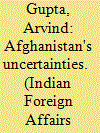

|
|
|
|
|
| Publication |
2013.
|
| Summary/Abstract |
What happens in Afghanistan post 2014 is uncertain. The situation being highly dynamic, it is difficult to make accurate forecasts. Most forecasts are gloomy, and predict political instability, a worsening security situation, a weak economy and violence. However, this pessimistic scenario need not materialise if post 2014 security mechanisms, economic assistance, and a stable political system are put in place. The outcome of the presidential elections on 5th April 2014, the nature of security uncertainties after 2014, and the success or failure of Karzai's efforts at reconciliation with Taliban would influence the situation post 2014.
|
|
|
|
|
|
|
|
|
|
|
|
|
|
|
|
| 7 |
ID:
110478
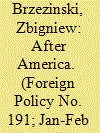

|
|
|
| 8 |
ID:
044809


|
|
|
|
|
| Publication |
London, Frances Pinter (Publishers) limited, 1983.
|
| Description |
xviii, 457p.hbk
|
| Series |
CSIS Publication Series on the Soviet Union in the 1980s
|
| Standard Number |
0861873386
|
|
|
|
|
|
|
|
|
|
|
|
Copies: C:1/I:0,R:0,Q:0
Circulation
| Accession# | Call# | Current Location | Status | Policy | Location |
| 030827 | 947.0853/BYR 030827 | Main | On Shelf | General | |
|
|
|
|
| 9 |
ID:
073601
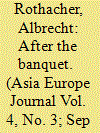

|
|
|
|
|
| Publication |
2006.
|
| Summary/Abstract |
The demise of Japan’s iron triangle, consisting of the LDP’s parliamentary party, the central ministries and the keiretsu conglomerates ruling Japan conjointly, has been diagnosed since some time now (Thayer, 1993; Blechinger, 2001). After more than one decade of an unprecedented crisis in Japan’s political economy which severely tested the competences and the legitimacy of Japan’s ruling classes it is about time to resume and to take stock of changes and continuities in her power structures. In a nutshell it appears that (1) the political system after serious shifts and jolts during the 1990s has reverted to the old one-and-a-half party system—with the conservative democrats (DPJ) displacing the Socialists of old as the main opposition party-and with the LDP remaining firmly in the lead role, exercising increased zoku control over the ministries and continuing hereditary pork barrel oriented constituency politics as its power base. The role of the party’s factions appears as somewhat diminished. (2) the central bureaucracy suffered a gradual erosion of functions and legitimacy, affecting notably the lead ministries MOF, MITI (METI) and MFA. This was however compensated in part by the large discretionary spending volumes disbursed by the merged Infrastructure Ministry (MLIT), the supervisory functions of the new Financial Services Agency (FSA), and the strengthened competences of the Prime Minister’s Office (PMO). (3) the prolonged economic crisis and asset deflation affecting city banks as keiretsu lead managers consequent to a series of bank mergers has seen some keiretsu disintegrate or amalgamate. Yet it appears that other keiretsu, like Sumitomo (having taken over Mitsui) and Mitsubishi remain consolidated, while some of the previously less integrated banking keiretsu continue in a fairly oversized and loosely merged fashion. Thus the keiretsu system’s micro-economic importance may have eroded somewhat compared to their heydays in the 1980s. Still keiretsu affiliated companies continue to dominate organized zaikai business interests, like the merged Keidanren–Nikkeiren.
|
|
|
|
|
|
|
|
|
|
|
|
|
|
|
|
| 10 |
ID:
027903
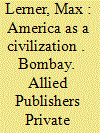

|
|
|
|
|
| Publication |
Bombay, Allied Publishers Private Limited, 1957.
|
| Description |
xi+lxvi, 464p.hbk
|
| Contents |
Vol. I: The Basic frame
|
|
|
|
|
|
|
|
|
|
|
|
Copies: C:1/I:0,R:0,Q:0
Circulation
| Accession# | Call# | Current Location | Status | Policy | Location |
| 015387 | 973/LER 015387 | Main | On Shelf | General | |
|
|
|
|
| 11 |
ID:
128611
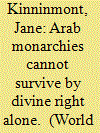

|
|
|
| 12 |
ID:
117398
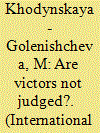

|
|
|
|
|
| Publication |
2012.
|
| Summary/Abstract |
THE ARAB SPRING which is still raging in the Middle East gives us all second thoughts about the methods of crisis settlement in any corner of the world. The Libyan crisis and the NATO operation codenamed Unified Protector suggests two questions: How far can the international community or its members go in their assistance to the state in crisis? What could and should be done to keep this aid within international law and to prevent it from developing into shameless abetting of the forces seeking regime change rather than democratic changes? In Libya, NATO demonstrated that foreign interference can become a "continuation of political intercourse." Certain states are trying to pass a "short victorious war" for a legitimate instrument the international community can employ to help peoples "fight for democracy" irrespective of the state, its role in regional stability, specifics of its political system and ethnoconfessional makeup and the people's readiness to greet changes. In fact, this tactics is employed for the sake of prompt economic and political dividends which painstaking and consistent efforts to develop political systems, economic and social spheres of these states cannot bring.
|
|
|
|
|
|
|
|
|
|
|
|
|
|
|
|
| 13 |
ID:
125125
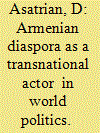

|
|
|
|
|
| Publication |
2013.
|
| Summary/Abstract |
IT IS CUSTOMARY to recognize sovereign states and the interstate organizations established on their basis as the leading actors in the political system of the contemporary world. Such theoretical schools as realism and, with some differences, constructivism support this approach.
|
|
|
|
|
|
|
|
|
|
|
|
|
|
|
|
| 14 |
ID:
112875
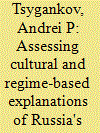

|
|
|
|
|
| Publication |
2012.
|
| Summary/Abstract |
Scholars disagree on how to interpret Russia's assertive foreign policy. According to some observers, Russia's authoritarian culture and political system have historically required the Kremlin to depend on the Western threat image at home and to engage in revisionist behaviour abroad. These observers recommend that Western nations abstain from engaging Russia as an equal contributor to shaping the global system. This article assesses the validity of the authoritarian expansionism theory by comparing it to other prominent perspectives on foreign policy, realism and constructivism. The article argues that, by perceiving Russia's historical and institutional distinctness as fundamentally threatening to the West, the theory overlooks important sources of foreign policy contestation at home and potentially varying directions abroad. The article selects the historically important cases of the Crimean War, the Cold War and the Russia-Georgia War to demonstrate the theory's flaws and to highlight the role of factors other than Russia's authoritarianism in the nation's foreign policy.
|
|
|
|
|
|
|
|
|
|
|
|
|
|
|
|
| 15 |
ID:
111603
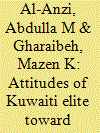

|
|
|
| 16 |
ID:
126540


|
|
|
|
|
| Publication |
2013.
|
| Summary/Abstract |
This article reports on an audience costs experiment embedded into a survey of the British public (N = 2235). We extend previous research into audience costs in three main directions. First, we provide clear and direct evidence that they exist for a second-order democratic power, the United Kingdom. Second, we show that the extent of audience costs varies, and at times substantially, along with features of the crisis situation that have not been examined empirically in this context before. In particular, the type of crisis strongly influences public reactions both to bluffing in general and to the wisdom or otherwise of escalating crises before backing down. While audience costs do appear to exist for a UK Prime Minister, he or she cannot inflate them by moving up the escalation chain. Rather, a limited use of force tends to mitigate these costs among the British public because it appears to them a more consistent strategy. Third, we show that public disapproval of a failed bluffing strategy is stronger among the more politically engaged, increasing the likelihood that audience costs will be paid at the ballot box.
|
|
|
|
|
|
|
|
|
|
|
|
|
|
|
|
| 17 |
ID:
123669
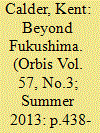

|
|
|
|
|
| Publication |
2013.
|
| Summary/Abstract |
This article considers the political-economic process by which "energy angst" created an embedded nuclear orientation in Japanese energy policymaking, and then how, following Fukushima, Japan initially tried to transform that structural tendency, through a political system poorly suited to reform, before edging back toward its traditional path. Due both to the prevailing systemic bias and the underlying political economy of nuclear power, the process of transformation promises to be a turbulent and extended one, with natural gas and energy efficiency being crucial tools for ameliorating the difficult realities of the domestic status quo.
|
|
|
|
|
|
|
|
|
|
|
|
|
|
|
|
| 18 |
ID:
127592
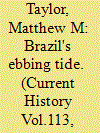

|
|
|
|
|
| Publication |
2014.
|
| Summary/Abstract |
Brazil is in a funk. The past year has brought violent protests, a new wave of corruption scandals, and wariness about the country's economic future. Former President Luiz Inácio Lula da Silva was known for his cheerful, tireless repetition of the message that "never before in the history of this country" had Brazil
accomplished so much. The contrast with his handpicked successor, Dilma Rousseff, was epitomized at the final match of the Confederations Cup, a major soccer tournament in June 2013, when Rousseff visibly stiffened as the crowd loudly booed her.
|
|
|
|
|
|
|
|
|
|
|
|
|
|
|
|
| 19 |
ID:
130244
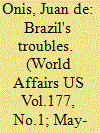

|
|
|
|
|
| Publication |
2014.
|
| Summary/Abstract |
With the extravaganza of the winter Olympic Games in Sochi over, the spotlight now turns to Brazil, the host of the FIFA World Cup championship in June. This tournament, the most widely viewed of global sports spectacles, is held every four years and involves thirty-two national teams, each of which has survived two years of regional competitions in Europe, Africa, Asia, and the Americas to reach the final play-offs. Starting on June 12th, sixty-four games will be played in four weeks, in stadiums all over Brazil, until the winner emerges in a final match on July 13th at the Maracanã, Rio de Janeiro's world-famous arena. Three million foreign fans are expected to visit Brazil, and billions of television viewers worldwide will watch the games. When the World Cup was awarded to Brazil in 2007-part of a remarkable parlay that included the award of the 2016 Summer Olympics to Rio as well-the country's economy was starting to boom as part of the BRIC upsurge that seemed ready to shake up international finance. The event was political from the onset, its significance potentially going well beyond the results on the playing fields where Brazil has won the world championship a record five times, a source of great national pride. But despite initial euphoria over being chosen to host the World Cup, Brazil is now experiencing doubts over whether it can pull off the event and second thoughts about the upsurge of influence on the international scene it was supposed to symbolize. The fervid devotion of Brazilians to soccer has made this country the Land of Football (as well as samba and Carnaval). Some non-Brazilian sports commentators have been baffled, therefore, by protest signs saying, "No to the Cup." But Brazil today is not just a land of football, it is also a land of public protests against corruption, heavy taxes, and deplorable public education and health services, cities with chaotic urban transport, markets with inflated consumer prices, and a dysfunctional political system that is manipulated by an elite for personal benefit.
|
|
|
|
|
|
|
|
|
|
|
|
|
|
|
|
| 20 |
ID:
155700
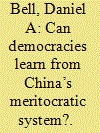

|
|
|
|
|
| Summary/Abstract |
“By learning from aspects of imperfect meritocratic systems, including Chinese-style political meritocracy, democratic systems can improve their performance and buttress their legitimacy.”
|
|
|
|
|
|
|
|
|
|
|
|
|
|
|
|
|
|
|
|
|